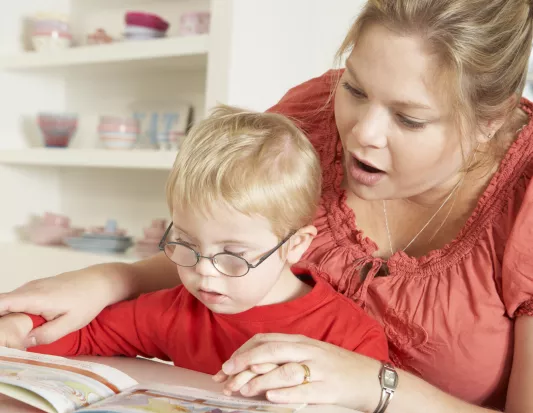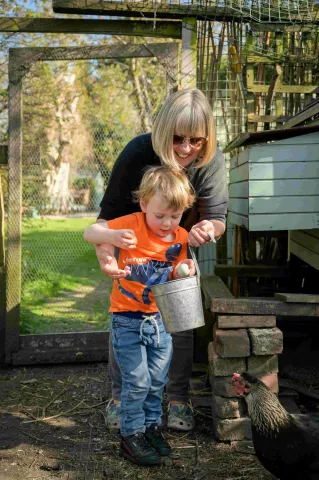How to write a statement for a DLA tribunal
If you (or someone who is helping you) are OK with writing, you should think about writing a statement for the tribunal. These can be very useful as they set out all your points, which means that you don't have to remember everything to say on the day.
They also give the appeal panel time to think about what you have said and why your child should be getting a higher award before they meet you.
This information applied to England, Wales, Scotland and Northern Ireland.
Last updated: March 2024

On the left is information to help you write your statement to the panel. It tells you all the things you should try to put in your statement and how to begin.
On the right is the statement Andrea sent to the panel looking at her son Alfie’s appeal. We have included it to show you what sorts of details about your child’s illness or disability you should include in your statement.
Information to help you write your statement | Andrea's Statement about her son Alfie’s difficulties |
Explain why you are writing. | I am writing to you to explain my reason for appealing the decision to award my son Alfie Nowak only the lower rate of care of DLA. |
Tell them what rate you think your child should be entitled to. If you don’t know, just say ‘I believe I am entitled to more’. Go to page x for more information about the different rates. | I am appealing the decision as I believe that Alfie is entitled to the high rate of care and low rate of mobility. |
If your child has a diagnosis or diagnoses explain them here. | Alfie has been diagnosed as having ADHD, Oppositional Defiance Disorder, learning difficulties, and behavioural problems. |
Explain the main symptoms or difficulties they have because of their illness or disability. Remember to explain how it affects them. | Alfie gets very distressed and finds it impossible to follow rules. He is sometimes violent and destructive. He can be so impulsive that he can put himself and others in danger. |
If your child has physical difficulty walking, it is most useful to talk about distances in terms that mean something to you. For example, it is better to say 'Walking between lessons causes him pain' than ‘He can only walk for 50 metres’. If your child can walk but needs more help than another child their age to keep them safe, calm or to find their way, explain what help they need, and what would happen if they didn’t get it. | Alfie can get very angry about going places, for example, going to school. It is only a 5 minute walk but it is a huge battle every day. In order to get him to go and to keep moving without difficulty I have to soothe and calm him constantly. I hold his hand because this helps keep him calm and means I can restrain him if he starts to get angry or panic. When he gets angry or panics he will impulsively run away, including into the road. Alfie also panics at the sound of unexpected noises - dogs barking, a loud motorbike, a scream or siren. At other times he can get aggressive or destructive and has tried to start fights or break things if I haven’t been there to physically restrain him. By contrast, most of his peers now walk to and from school on their own. |
If you can, spell out what help your child needs. Explain what problems they have with each part of their daily life. | Alfie often feels overwhelmed and needs prompting, encouragement and soothing to get up, get dressed, eat his breakfast and get washed and ready for school. He will often refuse to go upstairs and brush his teeth, for example, unless I go with him. This is because he is scared to be on his own. He also needs supervision - without it most days he would either eat far too much or get distracted and eat nothing at all. Without supervision he would not wash his face or brush his teeth or hair either. Alfie is scared of baths and showers and will avoid them at all costs. He has a bath and a hair wash twice a week and we have to go through a whole rigmarole of calming and encouraging and soothing to make that happen. Even then, sometimes he will get aggressive and cross about it and physically prevent it from happening. When we get to school Alfie often refuses to go in. He needs help from both me and his support worker to calm down and get into the classroom without running away or hurting anybody. At school he needs extra help and supervision to keep him engaged, soothed, and prevent him from getting excited and destructive or violent. He needs extra help to learn and to communicate confidently with his peers and teachers. He can be very oppositional about changing clothes and, to avoid difficulty, he doesn’t change for PE or put an apron on for Art. |
Alfie particularly struggles with transitions - for example when one activity ends and another begins. He needs extra help from his TA to cope with this and keep calm, and he is escorted round the school at these times. Similarly he finds the beginning and ending of school very hard and needs a lot of support from both me and his TA. Alfie finds it hard to go to sleep and wakes frequently. He requires a lot of reassurance and soothing to go to sleep and I am often still doing this at midnight. If he wakes in the night, he panics and anything can happen. I need to check on him so many times a night, it’s often easier for me to sleep in the same room. | |
Tell them if your child has ever been hurt (or might have been hurt), because of their illness or condition. You also need to tell them if they have hurt somebody else because of their illness. You should also say if the child have ever hurt himself/herself on purpose. | Alfie can act impulsively and make poor decisions that put him in danger. He can and has ran into the road when he was angry, he has climbed on to the school roof and attempted to jump off, and he has climbed over the fence and tried to run away. He needs to be supervised at all times so that he can be restrained if necessary. He can also be destructive to things and has broken other people’s phones, computers, glasses or artwork. He can also be very verbally aggressive to others and shout and threaten them. He has only very rarely actually hurt anyone but it has happened. |
Is there anything your child doesn’t do because they don’t have the help they need? | Alfie is a keen swimmer and is very good at it, but I cannot take him swimming as I have hurt my leg. |
If not getting the help you need causes other problems, it is very useful to say so. They won’t make the connection for themselves. | Having to be supervised by his mum all the time causes difficulties for Alfie’s self-esteem (which makes him more likely to be sad and angry and have difficult behaviour). If he could have help from other people to engage in swimming and other activities this would improve. |
It is important that they understand how often you need help. So try to make sure you have said how often each thing happens. | Alfie needs help to take his medication twice a day and to go to therapy at CAMHS once a week. Getting him to take his medication can take 2 minutes or it can take 30. Calming him and getting him to his therapy appointment takes 60 -90 minutes to get there, 30 minutes back. |
If you anyone helps your child by reminding or encouraging them to do things, explain it. | Alfie needs reminding and encouraging to do almost everything. |
If you disagree with anything in the papers they sent you, you need to tell them what was wrong and why this isn't right. | The report from the DWP said Alfie didn’t need help at night, but he requires between an hour and 3 hours more help to stay calm and in bed, and supervision to help him stay safe, than another child of his age every night when I would otherwise be in bed. |
If there is any other evidence that backs up what you are saying, refer to it. | The letter from Alfie’s school confirms his difficulties at school. The letter from CAMHS confirms his difficulties both day and night. |
When you have finished writing the statement, read it back through more than once. Does it say everything you want it to say? |
Related content







